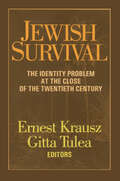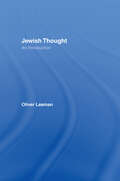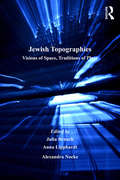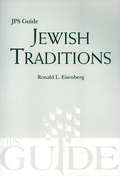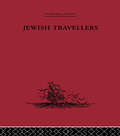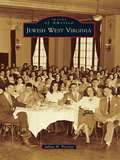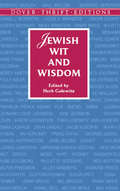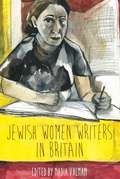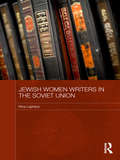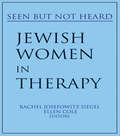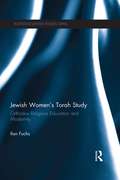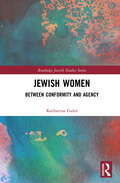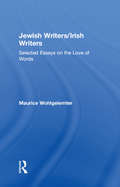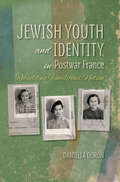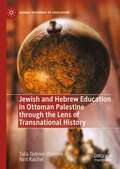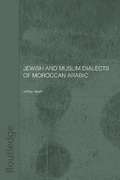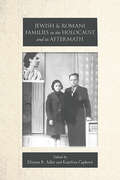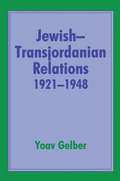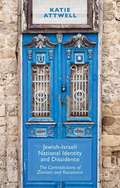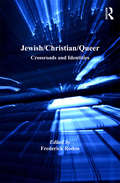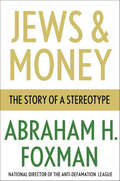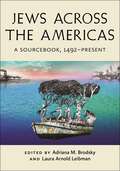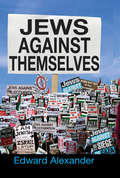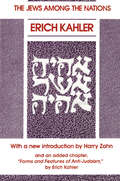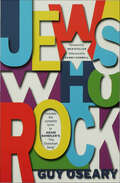- Table View
- List View
Jewish Survival: The Identity Problem at the Close of the 20th Century
by Ernest KrauszThese essays address Jewish identity, Jewish survival, and Jewish continuity. The authors account for and analyze trends in Jewish identification and the reciprocal effects of the relationship between the Diaspora and Israel at the end of the twentieth century.Jewish identification in contemporary society is a complex phenomenon. Since the emancipation of Jews in Europe and the major historic events of the Holocaust and the establishment of the State of Israel, there have been substantial changes in the collective Jewish identity. As a result, Jewish identity and the Jewish process of identification had to confront the new realities of an open society, its economic globalization, and the impacts of cultural pluralism. The trends in Jewish identification are toward fewer and weaker points of attachment: fewer Jews who hold religious beliefs with such beliefs held less strongly; less religious ritual observance; attachment to Zionism and Israel becoming diluted; and ethnic communal bonds weakening. Jews are also more involved in the wider society in the Diaspora due to fewer barriers and less overt anti-Semitism. This opens up possibilities for cultural integration and assimilation. In Israel, too, there are signs of greater interest in the modern world culture. The major questions addressed by this volume is whether Jewish civilization will continue to provide the basic social framework and values that will lead Jews into the twenty-first century and ensure their survival as a specific social entity.The book contains special contributions by Professor Julius Gould and Professor Irving Louis Horowitz and chapters on "Sociological Analysis of Jewish Identity"; "Jewish Community Boundaries"; and "Factual Accounts from the Diaspora and Israel."
Jewish Thought: An Introduction
by Oliver LeamanThis fresh and contemporary introduction to the Jewish faith, its philosophies and worldviews, explores debates which have preoccupied Jewish thinkers over the centuries and examines their continuing influence in contemporary Judaism. Written by Oliver Leaman, a leading figure in the field, the book surveys the central controversies in Judaism, including the protracted arguments within the religion itself. Topics range from the relations between Judaism and other religions, such as Islam and Christianity, to contemporary issues such as sex, gender and modernity. Central themes such as authority and obedience, the relations between Jewish and Greek thought, and the position and status of the State of Israel are also considered. The debates are further illustrated by reference to the Bible, as a profoundly realistic text in describing the long interaction between the Jews, their ancestors and God, as well as discussions about major thinkers, and passages from the ancient texts: The Mishnah, Talmud and Midrash. Oliver Leaman’s lively approach and light touch makes Jewish Thought ideal reading for anyone who wants to understand more about the Jewish faith and its outlook, past and present.
Jewish Topographies: Visions of Space, Traditions of Place (Heritage, Culture and Identity)
by Julia Brauch Anna LipphardtHow have Jews experienced their environments and how have they engaged with specific places? How do Jewish spaces emerge, how are they contested, performed and used? With these questions in mind, this anthology focuses on the production of Jewish space and lived Jewish spaces and sheds light on their diversity, inter-connectedness and multi-dimensionality. By exploring historical and contemporary case studies from around the world, the essays collected here shift the temporal focus generally applied to Jewish civilization to a spatially oriented perspective. The reader encounters sites such as the gardens cultivated in the Ghettos during World War II, the Israeli development town of Netivot, Thornhill, an Orthodox suburb of Toronto, or new virtual sites of Jewish (Second) Life on the Internet, and learns about the Jewish landkentenish movement in Interwar Poland, the Jewish connection to the sea and the culinary landscapes of Russian Jews in New York. Employing an interdisciplinary approach, with a strong foothold in cultural history and cultural anthropology, this anthology introduces new methodological and conceptual approaches to the study of the spatial aspects of Jewish civilization.
Jewish Traditions: JPS Guide (A JPS Guide)
by Dr. Ronald L. EisenbergThanks to these generous donors for making the publication of this book possible: Miles z&”l and Chris Lerman; David Lerman and Shelley WallockThe bestselling guide to understanding Jewish traditions, now in paperbackThis is a comprehensive and authoritative resource with ready answers to questions about almost all aspects of Jewish life and practice: life-cycle events, holidays, ritual and prayer, Jewish traditions and customs, and more. Ronald Eisenberg has distilled an immense amount of material from classic and contemporary sources into a single volume, which provides thousands of insights into the origins, history, and current interpretations of a wealth of Jewish traditions and customs.Divided into four sections—Synagogue and Prayers, Sabbaths and Festivals, Life-Cycle Events, and Miscellaneous (a large section that includes such diverse topics as Jewish literature, food, and plants and animals)—this is an encyclopedic reference for anyone who wants easily accessible, accurate information about all things Jewish. Eisenberg writes for a wide, diversified audience, and is respectful of the range of practices and beliefs within today's American Jewish community—from Orthodox to liberal.
Jewish Travellers
by Elkan Nathan AdlerFirst published in 1930. The wandering Jew is a very real character in the great drama of history. He has travelled as nomad and settler, as fugitive and conqueror, as exile and colonist and as merchant and scholar. Of necessity bilingual and therefore the master of many languages, the Jew was the ideal commercial traveller and interpreter.Based on the volume of 24 Hebrew texts of Jewish travellers by J D Eisenstein, this volume begins with the ninth century. After the sixteenth century geographical discoveries had made the whole world familiar to most people. Consequently, the wandering Jew becomes less the diplomatist or scientist but still remains a link between the scattered members of the Diaspora. The volume ends in the middle of the eighteenth century and taken as a whole provides a survey of Jewish travel during the Middle Ages. For this translation, some of the texts have been abridged, whilst retaining many of the original notes.
Jewish West Virginia (Images of America)
by Julian H. PreislerWest Virginia has a unique history of Jewish settlement dating back to 1849 when the first Jewish organization in the state, a Jewish burial society, was established by a small group of German Jewish immigrants in the city of Wheeling. From modest beginnings, Jews settled in towns and cities and established businesses and communal organizations. Since that time, the Jews of the Mountain State have been an integral part of the state's economic, cultural, and political life. Though always relatively small in size, West Virginia's Jewish population has been a strong advocate for the state and gained prominence in many areas. Readers will recognize images of well-known institutions such as Shoney's, Cohen's, Frankenberger's, Embee's, and others that bring back fond memories. Despite declines in Jewish population numbers, today's Jewish community remains active and involved in the life of the state.
Jewish Wit and Wisdom (Dover Thrift Editions: Speeches/Quotations)
by Herb Galewitz"It's no disgrace to be poor," observed Sholom Aleichem, "but it's no great honor, either." "Happiness is having a large, loving, caring, close-knit family in another city," remarked George Burns, while Marc Chagall noted that "Art is the unceasing effort to compete with the beauty of flowers and never succeeding." These and many more classic examples of Jewish wit and wisdom — sometimes hilarious, frequently profound, almost always incisive — enliven the pages of this entertaining and practical little volume.Some 500 aphorisms include observations and remarks from statesmen, writers, artist, philosophers, jurists, musicians, and celebrities — from the prophets of the Old Testament, the Talmud, and Maimonides to Joey Adams, Barbra Streisand, and Woody Allen. Here also are memorable quotes from Louis Brandeis, Martin Buber, Fanny Brice, Heinrich Heine, Sam Goldwyn, Golda Meir, Karl Marx, Groucho Marx, Herman Mankiewicz, Albert Einstein, and many others.Arranged alphabetically by author, these thought-provoking pronouncements will not only serve as a handy resource for speech writers and public speakers but will also amuse and inspire all readers.
Jewish Women Writers in Britain
by Nadia ValmanAgainst a background of enormous cultural change during the nineteenth and twentieth centuries, writing by British Jewish women grappled with shifting meanings of Jewish identity, the pressure of social norms, and questions of assimilation. Until recently, however, the distinctive experiences and perspectives of Jewish women have been absent from accounts of both British Jewish literature and women's writing in Britain. Drawing on new research in Jewish studies, postcolonial criticism, trauma theory and cultural geography, contributors in Jewish Women Writers in Britain examine the ways that these women writers interpreted the experience of living between worlds and imaginatively transformed it for a wide general readership. Editor Nadia Valman brings together contributors to consider writers whose Jewish identity was central to their practice as well as those whose relationship to their Jewish heritage was oblique, complicated, or mobile and figured in their work in varied and often unexpected ways. The chapters cover a range of genres including didactic fiction, devotional writing, modernist poetry, autobiographical fiction, the postmodern novel, memoir, and public poetry. Among the writers discussed are Grace Aguilar, Celia and Marion Moss, Katie Magnus, Lily Montagu, Amy Levy, Nina Salaman, Mina Loy, Betty Miller, Eva Figes, Ruth Fainlight, Elaine Feinstein, Anita Brookner, Julia Pascal, Diane Samuels, Jenny Diski, Linda Grant, and Sue Hubbard. Expanding the concerns of Jewish literature beyond existing male-centered narratives of the heroic conflict between family expectations and personal aspirations, women writers also produced fiction and poetry exploring the female body, maternity, sexual politics, and the transmission of memory. While some sought to appropriate traditional Jewish literary forms, others used formal and stylistic experimentation to challenge a religious establishment and social conventions that constrained women's public freedoms. The extraordinary range of responses to Jewish culture and history in the work of these writers will appeal to literary scholars and readers interested in Jewish women's history.
Jewish Women Writers in the Soviet Union (Routledge Studies in the History of Russia and Eastern Europe)
by Rina LapidusThis book presents the lives and works of eleven Jewish women authors who lived in the Soviet Union, and who wrote and published their works in Russian. The works include poems, novels, memoirs and other writing. The book provides an overview of the life of each author, an overview of each author’s literary output, and an assessment of each author’s often conflicted view of her "feminine self" and of her "Jewish self". At a time when the large Jewish population which lived within the Soviet Union was threatened under Stalin’s prosecutions the book provides highly-informative insights into what it was like to be a Jewish woman in the Soviet Union in this period. The writers presented are: Alexandra Brustein, Elizaveta Polonskaia, Raisa Bloch, Hanna Levina, Ol'ga Ziv, Yulia Neiman, Rahil’ Baumwohl’, Margarita Alliger, Sarah Levina-Kul’neva, Sarah Pogreb and Zinaida Mirkina.
Jewish Women in Therapy: Seen But Not Heard
by Ellen Cole Rachel J SiegelHere is the first volume ever to focus on the issues of Jewish women in the context of counseling and psychotherapy. Through poignant reflection and observation, the authors convey the richness and variety of Jewish women’s experiences and the Jewishness and femaleness of the concerns, issues, values, and attitudes that Jewish women--both clients and therapists--bring into the therapy room.Jewish Women in Therapy is a landmark book in many ways. It calls attention to the historical and political realities of the Jewish heritage and acknowledges the oppression of both Jews and women that therapists have typically ignored. And although Jewish women have participated in the therapeutic process, as clients, scholars, and therapists, seldom have they chosen to write about it.Never before have the writings of so many distinguished leaders in the field, including Melanie Kaye/Kantrowitz, Evelyn Torton Beck, and Susannah Heschel, been compiled. They examine the damaging stereotypes of Jewish women--the Jewish American Princess and the Jewish Mother--that flourish today. Chapters also address the conflicts that many women feel about being Jewish and being female, celebrate the contributions of Jewish women to feminism and to therapy, examine the deliberate omission of women from the political process and the religious ritual, and convey the complexities of the oppression that are still blatantly directed at both Jews and females.
Jewish Women's Torah Study: Orthodox Religious Education and Modernity (Routledge Jewish Studies Series)
by Ilan FuchsOne of the cornerstones of the religious Jewish experience in all its variations is Torah study, and this learning is considered a central criterion for leadership. Jewish Women’s Torah Study addresses the question of women's integration in the halachic-religious system at this pivotal intersection. The contemporary debate regarding women’s Torah study first emerged in the second half of the 19th century. As women’s status in general society changed, offering increased legal rights and opportunities for education, a debate on the need to change women’s participation in Torah study emerged. Orthodoxy was faced with the question: which parts, if any, of modernity should be integrated into Halacha? Exemplifying the entire array of Orthodox responses to modernity, this book is a valuable addition to the scholarship of Judaism in the modern era and will be of interest to students and scholars of Religion, Gender Studies and Jewish Studies.
Jewish Women: Between Conformity and Agency (Routledge Jewish Studies Series)
by Katharina GalorJewish Women: Between Conformity and Agency examines the concepts of gender and sexuality through the primary lens of visual and material culture from antiquity through to the present day. The backbone of this transhistorical and transcontextual study is the question of Jewish women’s agency in four different geographical, chronological, and methodological contexts, beginning with women’s dress codes in Roman-Byzantine Syro-Palestine, continuing with rituals of purity in medieval Ashkenaz, worship in papal Avignon and the Comtat Venaissin, and ending with marriage and divorce in Israeli film. Each of these explorations is interested in creating a dialogue between the patriarchal legacy of the traditional texts and the chronologically corresponding visual and material culture. The author challenges traditional approaches to the study of Jewish culture by employing tools from art history, archaeology, and film and media studies. In each of these different contexts, there is ample evidence that women—despite persistent overall structural discrimination—have found ways to challenge male constructs of gender norms. Ultimately, these examples from past and present times highlight women’s eminence in shaping Jewish history and culture. Bringing a new interdisciplinary lens to the study of the history of gender and sexuality, the book will be of interest to students and researchers of Jewish history and culture, art history, archaeology, and film studies.
Jewish Writers/Irish Writers: Selected Essays on the Love of Words
by Maurice Wohlgelernter"These essays on representative Jewish and Irish writers are true to the form's definition as an attempt or experiment rather than a credo. Wohlgelernter defines the author's ""excited imagination"" by thoroughgoing analysis of the work's constituent parts. He gives particular emphasis to the author's own words and expressions, those verbal inventions that linger in the mind long after the act of reading or criticism. He finds a passionate love of words and language forging a powerful link between Jewish and Irish literature, rooted as they are in similar historical experience. Both literatures engage the human struggle with life and death, virtue and weakness, success and failure, dreams and nightmares, all under the constant surveillance of tradition.Wohlgelernter divides his book into four general categories: the Holocaust, Jewish-American writers, Irish writers, and memoirs and autobiography. His chapters on Holocaust literature engage a range of literary perspectives that combine memoir, journalism, fiction, and philosophical reflection in the writings of Ladislas Fuks, Lucy Dawidowicz, Sabine Reichel, and Primo Levi. Chapters on postwar Jewish writers including Saul Bellow, Bernard Malamud, and Philip Roth explore the ambivalences of assimilation with its encroachments of a provincial past and dissatisfactions with mainstream culture. Wohlgelernter notes how all yoke street raciness and high cultural mandarin in a distinctive contribution to American prose style. A similar richness of language and preoccupation with the political and cultural claims of the past characterize the chapters on the great short story writer Frank O'Connor, the playwright Brendan Behan, and the Irish-American journalist and novelist Pete Hamill.The last decades of the twentieth century have seen a prolific outpouring of autobiographical writing, and in the concluding section of the book the author treats representative examples that amplify or reflect on the personal an"
Jewish Youth and Identity in Postwar France: Rebuilding Family and Nation (The Modern Jewish Experience)
by Daniella Doron“Highlights the debates surrounding family and identity as French Jewish communities slowly recovered and reestablished their place in the French nation.” —ChoiceAt the end of World War II, French Jews faced a devastating demographic reality: thousands of orphaned children, large numbers of single-parent households, and families in emotional and financial distress. Daniella Doron suggests that after years of occupation and collaboration, French Jews and non-Jews held contrary opinions about the future of the nation and the institution of the family. At the center of the disagreement was what was to become of the children. Doron traces emerging notions about the postwar family and its role in strengthening Jewish ethnicity and French republicanism in the shadow of Vichy and the Holocaust.“Doron’s book appears at a key moment. Its emphasis on children emerging from hunger, displacement and war should render it standard reading for policymakers, NGOs and others interested in shaping the destinies of today’s abandoned children.” —French History“Raises fundamental questions for the understanding of not only Jewish reconstruction in post-World War II France, but also Holocaust memory, postwar French society and culture and the history of postwar European families and children.” —French Politics, Culture and Society“Doron’s deftly argued and well researched book is an important intervention into a growing body of scholarship on the postwar decade. She convincingly documents the central role that the rehabilitation of Jewish children and the reconstruction of Jewish families played in post-war French Jewish reconstruction and underscores the importance of the decade following the war in shaping Jewish historical evolution in France.” —Maud Mandel, author of Muslims and Jews in France
Jewish and Hebrew Education in Ottoman Palestine through the Lens of Transnational History (Global Histories of Education)
by Nirit Raichel Talia Tadmor-ShimonyThis book uses transnational history to explain the formation of modern schools in a territory that lacks modern education. The emergence of modern Jewish education in Ottoman Palestine resulted from European actors and networks' infiltration of educational concepts due to several unique elements. One of them was the activity of transnational networks and actors. The other factor is the important place of education in shaping reality in the Jewish and Hebrew discourse. The area of Ottoman Palestine was almost devoid of modern education, so it is possible to examine the ways of transferring educational concepts. Historians can diagnose the starting point and locate the actors’ biographies and journeys. The book discusses and discovers several themes, such as molding five portraits of modern Jewish and Hebrew education graduates and the function of the school as a medical site due to the shortage of public health policy.
Jewish and Muslim Dialects of Moroccan Arabic (Routledge Arabic Linguistics Series)
by Jeffrey HeathThis is a comprehensive study of the Jewish and Muslim dialect networks of Morocco in its traditional boundaries, covering twenty-two Muslim and some thirty Jewish dialects of Moroccan Arabic.
Jewish and Romani Families in the Holocaust and its Aftermath
by Eliyana R. Adler Dalia Ofer Sarah Wobick-Segev Laura Hobson Faure Natalia Aleksiun Viktoria Banyai Robin Judd Anja Reuss Helena Sadílková Joachim Schlör Michal Unger Katerina Capková Volha BartashDiaries, testimonies and memoirs of the Holocaust often include at least as much on the family as on the individual. Victims of the Nazi regime experienced oppression and made decisions embedded within families. Even after the war, sole survivors often described their losses and rebuilt their lives with a distinct focus on family. Yet this perspective is lacking in academic analyses. In this work, scholars from the United States, Israel, and across Europe bring a variety of backgrounds and disciplines to their study of the Holocaust and its aftermath from the family perspective. Drawing on research from Belarus to Great Britain, and examining both Jewish and Romani families, they demonstrate the importance of recognizing how people continued to function within family units—broadly defined—throughout the war and afterward.
Jewish-Transjordanian Relations 1921-1948: Alliance of Bars Sinister
by Yoav GelberYoav Gelber traces the relation between the stae of Israel and the Hashemite dynasty of Transjordan by focusing on the connection between the two regions from as early as 1921 when Abdullah first appeared on the scene, and by using Jewish sources as well as British records.
Jewish-israeli National Identity And Dissidence
by Katie AttwellThis unique book provides a critical perspective on identity in questioning how Israeli Jews manage and manifest their concern for the Palestinian Other, eschewing presenting identities as concrete and, rather, examines their creation through discourse. Zionism and the Israeli state have constructed a Jewish national identity premised on demonisation of the Other. This book explores how internal critics use alternative discourses of identity to re-imagine this Jewish-Israeli national identity, and considers how they might fail. It combines a rigorous theoretical analysis of nationalism with an engaging examination of the identifications and contradictions of eleven Jewish-Israeli individuals. Featuring, among others, high profile journalist Gideon Levy, veteran maverick Uri Davis and literary novelist Dorit Rabinyan, Attwell provides a revealing insight into national identity, political dissent, conflict and resistance.
Jewish/Christian/Queer: Crossroads and Identities (Queer Interventions Ser.)
by Frederick RodenAt a time when major branches of Judaism and most Christian denominations are addressing the relationship between religion and homosexuality, Jewish/Christian/Queer offers a unique examination of the similarities between the queer intersections of Judaism and Christianity, and the queer intersections of the homosexual and the religious. This volume investigates three forms of queerness; the rhetorical, theological and the discursive dissonance at the meeting points between Christianity and Judaism; the crossroads of the religious and the homosexual; and the intersections of these two forms of queerness, namely where the religiously queer of Jewish and Christian speech intersects with the sexually queer of religiously identified homosexual discourse. Including essays on literature and literary theory, Christian theology, Biblical, Rabbinic, and Jewish studies, queer theory, architecture, Freud, gay and lesbian studies and history, Jewish/Christian/Queer will have a truly interdisciplinary appeal.
Jews & Money: The Story of a Stereotype
by Abraham H. FoxmanIn the wake of Bernie Madoff's ruinous investment schemes, Abe Foxman takes a cultural and political look at the many variations throughout history of the assumptions made about Jews and money. These include Jews as greedy global capitalists; Jews as wealthy secret communists; Jews as cheapskates; and Jews controlling the media with their money to unduly influence society. Foxman makes the case that these stereotypes have permeated cultures globally and argues that these beliefs are rooted in deep-seated and pervasive anti-Semitism. As with all forms of bigotry, society at large needs to respond to the persistence of stereotypes by educating the young, denouncing hate speech, and by encouraging Jews, like all groups, to express pride in their ethnic and religious heritage.
Jews Across the Americas: A Sourcebook, 1492–Present (Goldstein-Goren Series in American Jewish History)
by Adriana M. Brodsky and Laura Arnold LeibmanAn overview of the history of American Jewry using primary sources from Latin America, theCaribbean, Canada, and the United StatesJews Across the Americas is a groundbreaking sourcebook capturing the historical diversity and culturalbreadth of American Jews across Latin America, the Caribbean, Canada, and the United States. Featuringprimary documents as well as scholarly interpretations, Jews Across the Americas builds upon newdevelopments in Jewish Studies, engaging with transnationalism, race, sexuality, and gender, andhighlighting the lived experiences of those often left out of Jewish history.Jews Across the Americas features an impressively broad and far-reaching range of historical sources,including artifacts and objects that have not previously been featured as integral to Jewish history in theWestern hemisphere. Entries teach readers how to understand everything from wills andadvertisements to sermons, and how to interpret photographs, domestic architecture, and comics.Whether it’s a recipe from Brazil that blends Moroccan and Amazonian foodways, or a text about thefirst non-binary Jew to cross the Atlantic in the eighteenth century, each entry broadens ourunderstanding of Jewish American history.
Jews Against Themselves
by Edward AlexanderThis volume features powerful essays by Edward Alexander on the phenomenon of anti-Zionism on the part of the Jewish intelligentsia. It also analyses the explosive growth of traditional anti-Semitism, especially in Europe, among intellectuals and Muslims. Alexander notes that anti-Zionism has established a presence even in Israel, where it frequently takes the form of intellectuals sympathizing with their country's enemies and perversely apologizing for their own existence.Alexander begins with an examination of the origins of Jewish self-hatred in nineteenth-century Europe. He then explores the mindset of disaffected Jews in reacting, or failing to react, to the two events that shape modern Jewry: the Holocaust and the founding of the State of Israel.The book concludes with a focus on contemporary anti-Zionism, including three essays about the role played by Jews in the Boycott, Divestment, and Sanctions Movement to expel Israel from the family of nations. A final essay addresses the need for American Jews to decide whether they are going to judge Judaism by the standards of The New York Times or The New York Times by the standards of Judaism.
Jews Among the Nations
by Erich KahlerThis is an augmented edition of a superb volume by one of the foremost analysts of European institutions and ideas. Here the late Erich Kahler turns his attention to the special character of the Jewish people, formed uniquely through the interaction of internal and external circumstances in which past and present merge.The chapters in this book deal with persistent problems of Jewish identity. Kahler claims these can be fully understood only by awareness of the close interconnection between the singular ethnic nature and the unique social structure of the Jewish people. He discusses the Jews in Europe, specifically the historical implications of a strict tribal ritual that yet permitted the widest spiritual scope.The second half of the book concerns anti-Semitism, in relation to Jews and Germans. How did the German people, seemingly so congenial to the Jews, develop a murderous revulsion against them, ending a long and fruitful symbiosis? Kahler sees this as a parallel to the parricidal rejection of the Jews by the Christian church. His argument is deepened in an added chapter, new to this volume, on the major forms and features of anti-Judaism, 'in which the earlier theme of the universal and the specific are seen as central not only to the inner history of Judaism but also to the specific interaction of Jews and Gentiles throughout social history.
Jews Who Rock
by Guy OsearyForeword by Ben StillerAfterword by Perry FarrellJewish achievement in the sciences? Celebrated. Jews in literature? Lionized. But until now, there's been no record of the massive contributions of Jews in Rock n' Roll. Jews Who Rock features 100 top Jewish rockers, from Bob Dylan to Adam Horowitz, Courtney Love (yes, she's half Jewish) to John Zorn, with a concise page of essential data and a biography of each one.Includes the complete lyrics to "The Chanukah Song" by Adam Sandler
